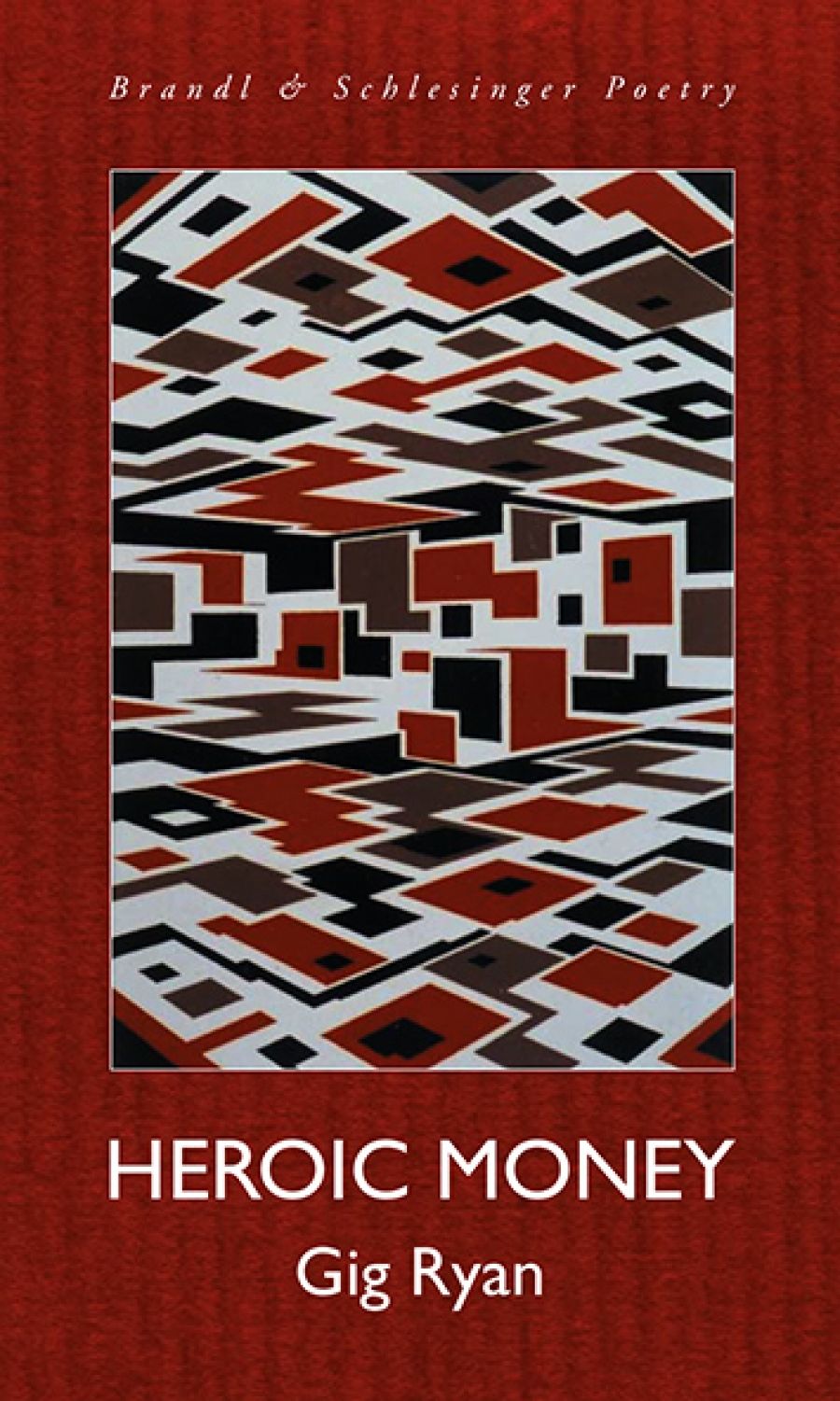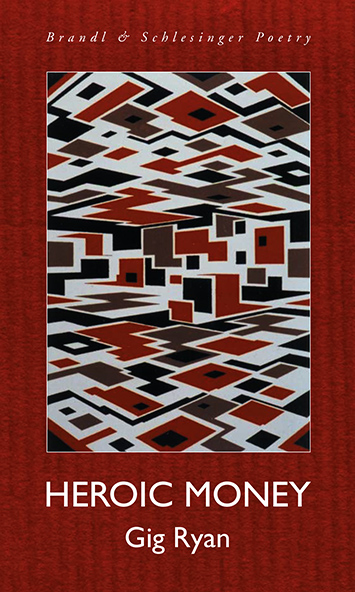
- Free Article: No
- Contents Category: Poetry
- Review Article: Yes
- Article Title: Moons and Money
- Online Only: No
- Custom Highlight Text:
It may be a question not so much of what poetry we read but of how we read it. I confess myself to be a snail-pace reader – a Marianne Moore snail, that is – and rereader, above all a rereader. And the problem with being a university teacher of poetry is that you are obliged to appear to believe, for professional purposes, that poetry is explicable. ‘Read it? I haven’t even lectured on it!’ (with apologies to Stephen Knight). Yet the context in which one reads a poem may determine one’s sense of it.
- Book 1 Title: Heroic Money
- Book 1 Biblio: Brandl & Schlesinger $21.95 pb, 66 pp
- Book 1 Cover Small (400 x 600):

- Book 1 Cover (800 x 1200):

- Book 2 Title: Sun Shadow, Moon Shadow
- Book 2 Biblio: Vagabond Press, $12 pb, 32pp
This notion came into sharp focus for me recently when reading John Tranter’s new volume, ultra. I had read some of these poems individually, in London Review of Books, in Cordite, in Heat. But, read thus, the poems couldn’t reveal their common feature, that each of the twenty-four is composed of ten five-line stanzas (if that be not too precise a term) occupying two pages in eleven-point Garamond Book. So the first poem, ‘Lavender Ink’, is something of a ring-in, needed in order that the first of the fifty-line poems begin on an even-numbered page, and thus the ten stanzas face each other. I am uncertain whether there be any numerological significance in fifty, or in twelve hundred plus the number of lines in ‘Lavender Ink’, though doubtless Alastair Fowler or A. Kent Hiaett could find one, or several.
Reading Gig Ryan’s Heroic Money and J.S. Harry’s Sun Shadow, Moon Shadow side-by-side, or consecutively, was illuminating, for one can focus upon the distinctive qualities of each through their striking dissimilarities. Yet the question of whether one does justice to individual poems, or individual poets, arises when one considers what an atypical practice it is to read a volume of poetry from go to whoa, rather than encountering the poems in a more leisurely fashion in magazines. I confess, in the present instance, to feeling that reading a volume works in Harry’s favour but not in Ryan’s.
Gig Ryan does good volume titles: Manners of an Astronaut; Excavation; Pure and Applied; Heroic Money. She offers the occasional compelling (Forbesian?) similitude – ‘self-absorbed like a columnist’ – and the odd neatly twisted allusion: ‘It was quite a sesh – / the nymph complaining for the death of her fawn [sic].’ These instances share a common feature, an urge for compression, a sort of ‘heroic’ intensity. Indeed, the forty-two poems occupying Heroic Money’s sixty-six pages in ten-point Gill Sans are distilled, intense in the extreme. The question is, can one take sixty-six pages of unalloyed intensity in one hit, so to speak? I see, and this is not meant unkindly, rather as an attempt to capture my relation with the book in an image, Heroic Money at a party, sitting in a corner, avoiding the roistering herd, its knees pulled up under its chin, its arms crossed, pressing those knees to its breast. I, therefore, have difficulty in accepting the categorisation of the volume as ‘satire’ (see the cover-note by Ivor Indyk, to whose authority I defer), for surely satire is more sociable than these inner-directed lyrics.
Can it be Gig Ryan’s flouting of the conventionalities of syntax and of punctuation that provokes my explicatory – self-explicatory, that is – urges. Consider the opening of the title-poem:
I throw in my lot with them
showing me the crashed lights they drove into
My mind is filled with condiments
pompous and self-pitying, which they escape
‘I am unworthy’.
Always allowing for typographical glitches, the period at the end suggests that this is a sentence. If so, why is ‘My’ capitalised? Not because it begins a line, if we observe the lines preceding and succeeding it. Does ‘pompous and self-pitying’ qualify the ‘condiments’ or the ‘mind’? Does the lack of syntactic connection between the final and the penultimate lines deliberately generate ambiguity? (Is there, for example, a suppressed ‘the categorisation’ after ‘they escape’?). These are, I trust, not merely pedantic questions but paradigms of Ryan’s manner which lead to my difficulty in approaching – ‘Care to dance?’ – the poems. To state that the poem is ‘surreal’ seems to me merely an evasion. Perhaps these instances are examples of the intensity, the compression, I spoke of earlier? I am further puzzled by the occasional footnotes, particularly the one in ‘Cramped and constricted’:
You shut the window
and push the day away
pilled effacing curtain
‘stirring my brandy with a nail’*
Weep no more, sad fountains
*Blues song.
Why not also annotate the following line, by an anonymous sixteenth-century poet, immortalised in music by John Dowland: ‘Weep no more, sad fountains / What need you flow so fast?’? But, when Ryan’s lyric intensity works, as it does in ‘Actaeon’ (no gloss supplied – or needed?), then we have poetry of a very high order, obeying Uncle Ez’s (who also wrote memorably of the unfortunate huntsman) injunction to ‘MAKE IT NEW’.
Like Pound, J.S. Harry enjoys a good upper-case character, as well as a bold face, and italic script. Harry’s character, Peter Henry Lepus, aka Pierre Henri Lepus in Creole (for his origin and interests see ‘Biographical Notes’ to Harry’s The Life on Water and the Life Beneath, 1995, and David Brooks’s ‘Foreword’ to the volume under review), puts on a bold face but cannot always maintain a stiff upper lip, as his encounter with ‘Chairman Miaow’ in the moonlight indicates:
He wonders if the sardines
got into the can alive& what it would be like
to die there …What it would be like
to … die … inside the Chairman… is there moonlight? …
Harry’s poems, like Peter himself, are sociable, discursive and, above all, playful, at once virtuosically light-hearted and deadly (‘inside the Chairman’) serious. Peter meets the American critic Altieri, attends the Poets’ Union 1998 Moon Viewing Party (‘THERE ARE NO / AUSTRALIAN GRASS ROOTS POETS AT THIS PARTY’), hears from Altieri of a writer called ‘Marks’ (the rich economies of homophones!), instructs on the first-person pronoun (‘I die, you singular die, he dies, she dies, it dies, / you plural die, we die, they die – ’), entertains a bounty on the scalps of rabbiters, is bemused with / by Picasso at The Nippy Rabbit, learns about ‘under-determined’ poetry from the Canberra poets and about ‘OVER-DETERMINED’ poetry from some Sydney poets, and may have met Wittgenstein in Vienna in 1902. It is perhaps from this period (that is, a century ago) onward that his sense of ‘deracination and disorientation becomes more pronounced’. I confess that Peter Henry Lepus is my favourite character in the world of letters since Leopold Bloom perambulated through Dublin in 1904. Has Peter met Bloom? Near the pork butcher’s, perhaps?
Does Peter have a credo? Perhaps it may be found in ‘Laws: 1’.
If
you were hoping
this or any
poem
was going to leap up
off its page
& absolve you
from the critical
necessity
of having
to work out
how to live
your life
for yourself
you were wrong.
‘Hoping’, not ‘hopping’. Nor is this or any poem going to absolve one from the ‘critical necessity’ of reading it one’s self. Somehow, miraculously, Harry manages to be playful, lucid and philosophical all at once. Peter Henry may have ‘one paw resting / on a fat volume of Derrida’, but there is no fat on the musculature of Harry’s poetry, none of Derrida’s tortuous if profitable circumfluity.
It goes without saying, but should not be left unsaid, that Brandl & Schlesinger and Vagabond Press are to be saluted for their publishing of the cutting-edge of Australian poetry.


Comments powered by CComment